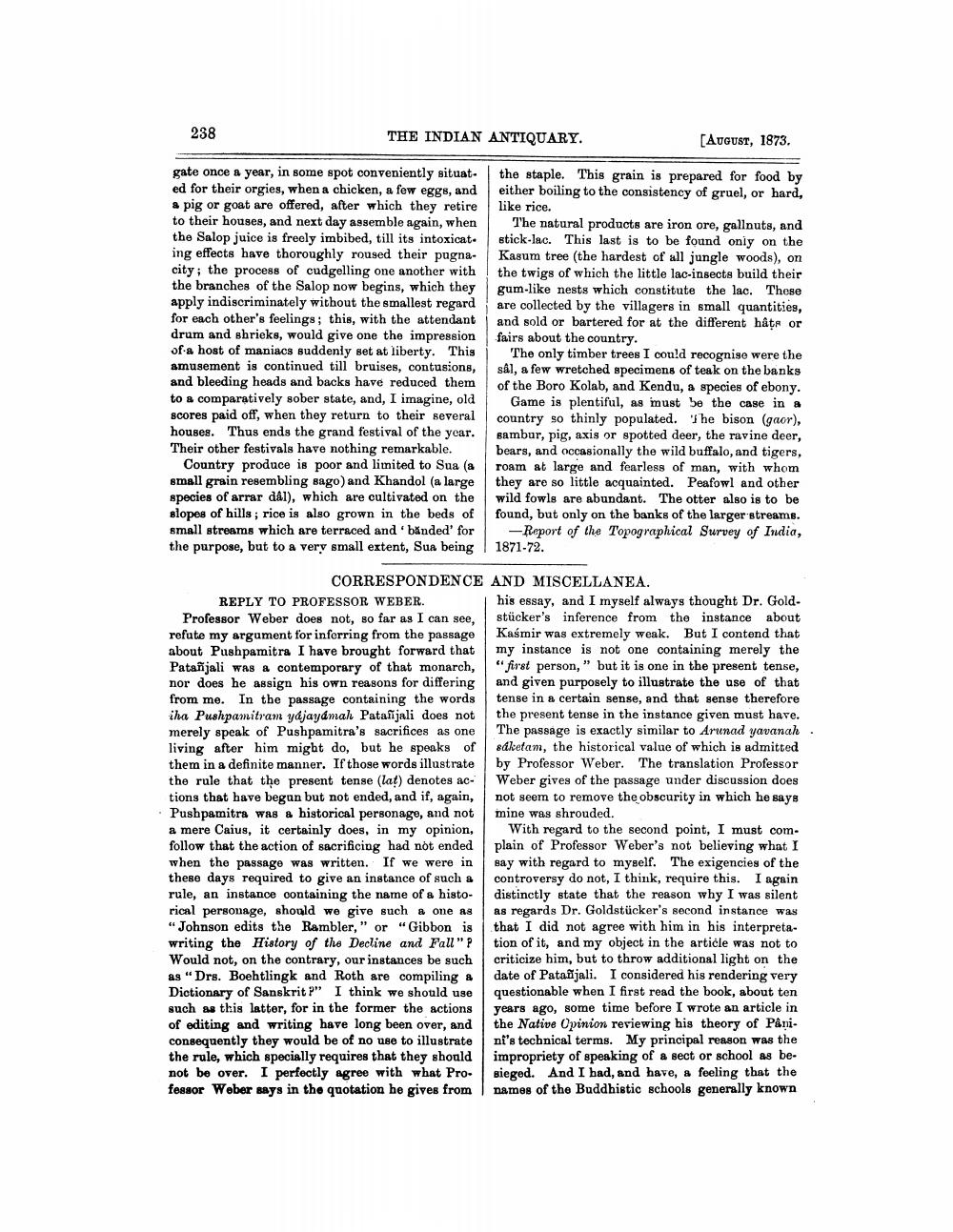________________
238
THE INDIAN ANTIQUARY.
gate once a year, in some spot conveniently situat ed for their orgies, when a chicken, a few eggs, and a pig or goat are offered, after which they retire to their houses, and next day assemble again, when the Salop juice is freely imbibed, till its intoxicat. ing effects have thoroughly roused their pugnacity; the process of cudgelling one another with the branches of the Salop now begins, which they apply indiscriminately without the smallest regard for each other's feelings; this, with the attendant drum and shrieks, would give one the impression of a host of maniacs suddenly set at liberty. This amusement is continued till bruises, contusions, and bleeding heads and backs have reduced them to a comparatively sober state, and, I imagine, old scores paid off, when they return to their several houses. Thus ends the grand festival of the year. Their other festivals have nothing remarkable.
Country produce is poor and limited to Sua (a small grain resembling sago) and Khandol (a large species of arrar dâl), which are cultivated on the slopes of hills; rice is also grown in the beds of small streams which are terraced and 'banded' for the purpose, but to a very small extent, Sua being
CORRESPONDENCE
REPLY TO PROFESSOR WEBER.
Professor Weber does not, so far as I can see, refute my argument for inferring from the passage about Pushpamitra I have brought forward that Patanjali was a contemporary of that monarch, nor does he assign his own reasons for differing from me. In the passage containing the words iha Pushpamitram yajayamah Patanjali does not merely speak of Pushpamitra's sacrifices as one living after him might do, but he speaks of them in a definite manner. If those words illustrate the rule that the present tense (lat) denotes actions that have begun but not ended, and if, again, Pushpamitra was a historical personage, and not a mere Caius, it certainly does, in my opinion, follow that the action of sacrificing had not ended when the passage was written. If we were in these days required to give an instance of such a rule, an instance containing the name of a historical personage, should we give such a one as "Johnson edits the Rambler," or "Gibbon is writing the History of the Decline and Fall"? Would not, on the contrary, our instances be such as "Drs. Boehtlingk and Roth are compiling a Dictionary of Sanskrit ?" I think we should use such as this latter, for in the former the actions of editing and writing have long been over, and consequently they would be of no use to illustrate the rule, which specially requires that they should not be over. I perfectly agree with what Professor Weber says in the quotation he gives from
[AUGUST, 1873.
the staple. This grain is prepared for food by either boiling to the consistency of gruel, or hard, like rice.
The natural products are iron ore, gallnuts, and stick-lac. This last is to be found only on the Kasum tree (the hardest of all jungle woods), on the twigs of which the little lac-insects build their gum-like nests which constitute the lac. These are collected by the villagers in small quantities, and sold or bartered for at the different hâts or fairs about the country.
The only timber trees I could recognise were the sål, a few wretched specimens of teak on the banks of the Boro Kolab, and Kendu, a species of ebony.
Game is plentiful, as must be the case in country so thinly populated. The bison (gaor), sambur, pig, axis or spotted deer, the ravine deer, bears, and occasionally the wild buffalo, and tigers, roam at large and fearless of man, with whom they are so little acquainted. Peafowl and other wild fowls are abundant. The otter also is to be found, but only on the banks of the larger streams. -Report of the Topographical Survey of India, 1871-72.
AND MISCELLANEA.
his essay, and I myself always thought Dr. Goldstücker's inference from the instance about Kasmir was extremely weak. But I contend that my instance is not one containing merely the "first person," but it is one in the present tense, and given purposely to illustrate the use of that tense in a certain sense, and that sense therefore the present tense in the instance given must have. The passage is exactly similar to Arunad yavanah. saketam, the historical value of which is admitted by Professor Weber. The translation Professor Weber gives of the passage under discussion does not seem to remove the obscurity in which he says mine was shrouded.
With regard to the second point, I must complain of Professor Weber's not believing what I say with regard to myself. The exigencies of the controversy do not, I think, require this. I again distinctly state that the reason why I was silent as regards Dr. Goldstücker's second instance was that I did not agree with him in his interpretation of it, and my object in the article was not to criticize him, but to throw additional light on the date of Patanjali. I considered his rendering very questionable when I first read the book, about ten years ago, some time before I wrote an article in the Native Opinion reviewing his theory of Pânini's technical terms. My principal reason was the impropriety of speaking of a sect or school as besieged. And I had, and have, a feeling that the names of the Buddhistic schools generally known




